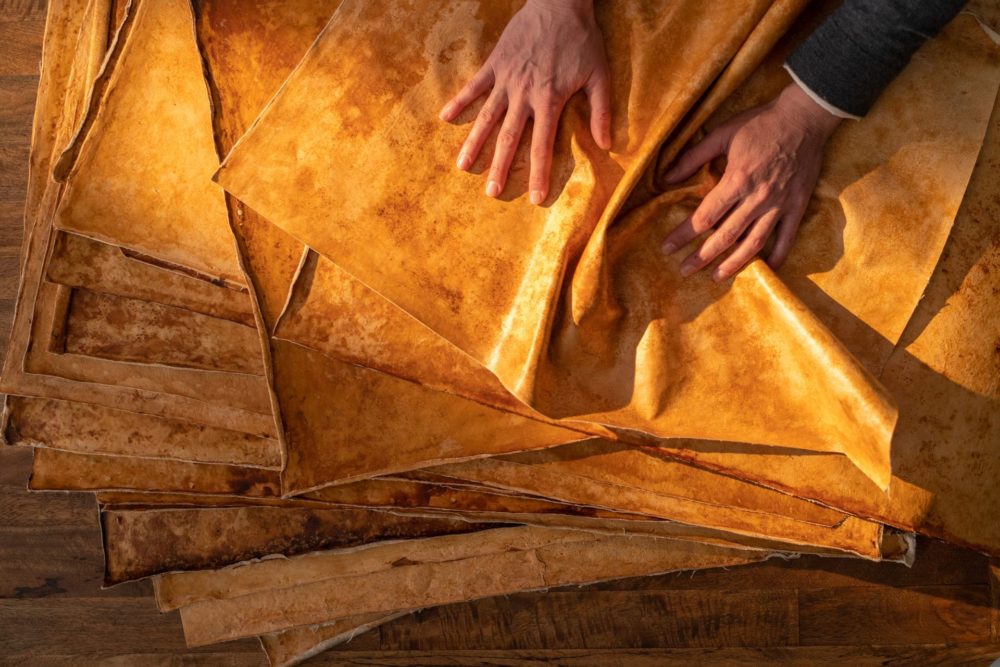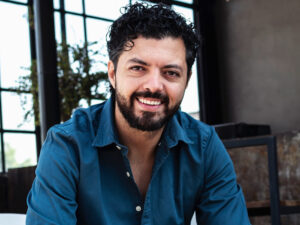MycoWorks, which produces an animal-free leather alternative, has raised $45 million in a Series B round co-led by Taiwan’s WTT Investment and California’s DCVC Bio.
New investors included Valor Equity Partners, Humboldt Fund, and Gruss & Co, as well as “several major fashion brands” and other undisclosed parties. The startup can now also claim celebrity backing, with musician John Legend and actor Natalie Portman participating in the round.
Existing investors including AgFunder, Novo Nordisk-affiliated Novo Holdings, 8VC, SOSV, Wireframe Ventures, and former Apple and Google engineer Tony Fadell returned for the Series B raise. [Disclosure: AgFunder is AFN‘s parent company.]
MycoWorks also announced the opening of a new plant for manufacturing its non-animal leather in Emeryville, California, which will increase the company’s production capacity by over 10x. The Series B funding will be used to set up additional plants.
Founded in 2013, San Francisco-based MycoWorks has developed a non-animal alternative to cow leather using mycelium – a root-like structure grown by various types of fungi to absorb nutrients.
Its flagship product — dubbed Reishi — is produced using the startup’s patented Fine Mycelium platform, which grows and interweaves select mycelium cells into sheets.
These sheets are then sent off to be finished by traditional leather tanneries using sustainable, chrome-free methods, “showcasing how MycoWorks brings technological innovation to the traditional craftsmanship that is essential to luxury fashion brands,” the startup said in statement.
According to CEO Matthew Scullin, this is what differentiates MycoWorks from the small but growing number of biomaterials startups using mycelium to create analogs of less sustainable animal-derived materials or plastics. These include Indonesia’s Mycotech Lab, California’s Bolt Threads, and New York’s Evocative Design, among others.
“Fine Mycelium technology is what sets us leagues apart from other mycelium companies, all of whom make ‘mushroom leather’ – an old technology that MycoWorks employed many years ago and since evolved into Fine Mycelium for our Reishi product,” he told AFN.
“Fine Mycelium has a tightly interwoven cellular structure, giving Reishi a huge boost in strength, durability, and hand feel. As such, we’re the only mycelium material — and only biomaterial — that performs on par with cowhide leather, and can surpass its performance in the future.”
MycoWorks’ Series B announcement comes less than a year after it closed its $17 million Series A round. Taken together, that’s an impressive funding haul for a highly experimental startup in the midst of a global pandemic and all the economic uncertainty that comes with it.
Why did AgFunder decide to invest in MycoWorks? Find out here
While startups across all sectors have had a tougher time convincing investors to part with their capital this year, Scullin reported a more positive experience.
“I can’t comment on the broader market, but we saw heavy interest from investors and got a great deal done,” he said.
This have something to do with the startup witnessing, in its own words, “accelerating demand for [its] products through 2020 despite the global downturn due to Covid-19” from prospective customers – which are mainly apparel, footwear, and luxury goods makers.
“I think that what happened in 2020 was a culling of projects, and we saw fashion brands’ true priorities rise to the top and survive the year,” Scullin said.
“Across the entire industry we saw that sustainability was in the top two or three — and more often than not, the number one — innovation priorities in luxury, footwear, and the broader fashion industry. After the initial shock from Covid-19 in March companies smartly eliminated low-priority projects. In the ensuing months, and with fewer items on their plates, sustainability saw an acceleration,” he suggested.
“I believe that the huge tailwinds carrying the health and wellness movement — which MycoWorks is a part of — through the economy may also have been boosted by Covid-19 and the world’s heightened awareness of [its] health, but this is a bit harder to measure.”
MycoWorks said that the first products made with Reishi will be available to consumers “in the coming months” as it unveils several partnerships “with leading global luxury fashion and footwear brands.”
Got a news tip? Email me at [email protected] or find me on Twitter at @jacknwellis





